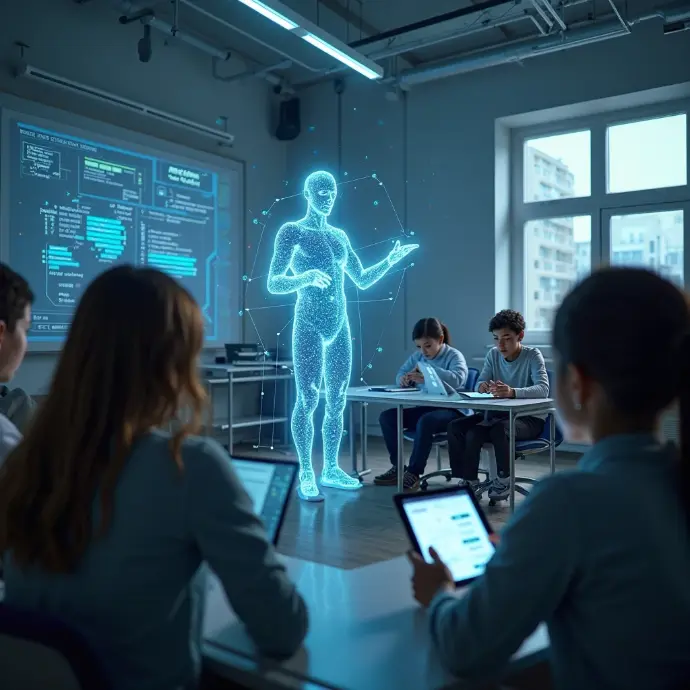This article addresses the broad and promising opportunities that emerging technologies offer to the education sector. In particular, it delves into the topic of artificial intelligence applied to teaching, under the title "Artificial Intelligence in Education: Towards Personalized Teaching." This analysis invites reflection on how the integration of these technological tools is transforming the learning process, providing innovative experiences tailored to the specific needs of each student. Join us on this journey toward the future of education, where technology and pedagogy converge to redefine educational practices and enhance academic performance.
Introduction
Artificial intelligence (AI) is a field of computer science that focuses on the creation of systems capable of performing tasks that require human intelligence. These systems are capable of learning, reasoning, planning, recognizing patterns, and making decisions autonomously. AI seeks to simulate human cognitive processes through algorithms and mathematical models.
In the educational context, the integration of artificial intelligence offers the opportunity to personalize teaching, adapting the content and learning methodology to the individual needs of each student.
AI in education can take the form of virtual assistants, adaptive tutoring systems, automated assessment tools, and personalized learning platforms.
Challenges of Integrating AI in Education
The integration of artificial intelligence in education raises ethical and privacy challenges that must be addressed carefully and proactively. One of the main ethical aspects relates to the collection and use of students' personal data. It is essential to ensure the privacy and security of information, as well as to obtain appropriate consent for data collection and processing. Furthermore, it is crucial to establish clear policies on the ethical use of AI in the educational environment, avoiding bias and discrimination.
Regarding privacy, it is critical that educational institutions implement robust security measures to protect students' sensitive information. Transparency in data handling and accountability are essential elements to ensure trust in the integration of AI in education.
Equity in access to technology is a significant challenge when considering the implementation of artificial intelligence in education. Ensuring that all students have the opportunity to benefit from AI-based tools and resources is crucial to prevent the widening of the digital divide. The lack of equitable access to technological devices and internet connectivity can exacerbate existing inequalities, making it necessary to implement strategies to ensure all students have the opportunity to participate in AI-enriched educational environments.
Teacher training in artificial intelligence is a fundamental aspect of ensuring that educators are prepared to make the most of AI-based tools and resources in the classroom. It is crucial to provide ongoing training opportunities that allow them to acquire the skills and knowledge necessary to effectively integrate AI into their teaching practices. Training should also address ethical and privacy issues, as well as strategies to ensure equitable access to technology for all students.
Personalizing Teaching with AI
The implementation of artificial intelligence in education opens the door to unprecedented learning personalization, tailoring educational content to the specific needs of each student. Through data analysis, AI is able to detect each student's strengths, areas for improvement, and predominant learning style. This allows for the design of study materials, activities, and assessment tools that align with each student's individual pace and abilities, promoting more effective and meaningful learning.
Furthermore, AI can suggest additional personalized resources, such as supplementary readings, explanatory videos, or custom-designed exercises, thus enriching students' educational experience. These recommendations not only optimize time and effort inside and outside the classroom, but also create a more equitable and inclusive educational environment that responds to each student's unique needs.
Finally, the personalization of educational content significantly contributes to closing learning gaps and improving overall academic performance, consolidating a more effective educational model tailored to individual needs.
Tracking the progress of individual students has become significantly more efficient with the integration of artificial intelligence in education. By continuously analyzing data, AI uncovers learning trends, highlights areas where students face challenges, and evaluates advancements in their academic achievements. This comprehensive insight equips educators to offer precise and timely feedback while addressing any emerging difficulties in the learning journey.
With this level of detailed monitoring, teachers can pinpoint the exact areas where students require extra support, adapt teaching strategies to meet unique needs, and set practical, individualized learning goals. By focusing on the student, this targeted approach not only boosts academic performance but also nurtures greater motivation and self-confidence in their learning capabilities.
In addition, monitoring individual progress enables the creation of detailed performance reports. These reports provide valuable insights for parents, guardians, and other professionals involved in the student's academic development, ultimately fostering a well-rounded support system.
The incorporation of artificial intelligence (AI) into education presents significant potential for stimulating active student engagement by providing more interactive learning experiences tailored to each student's individual characteristics. Through the implementation of advanced technologies, such as virtual tutoring systems, dynamic simulations, and educational gaming platforms, AI enables a more immersive and personal approach to education. These tools allow for adjusting both the level of complexity of the challenges posed and the feedback mechanisms, precisely addressing the specific needs of each student.
Furthermore, AI fosters collaboration and peer exchange by analyzing individual patterns related to teamwork preferences, communication styles, and shared areas of interest. This fosters the creation of highly collaborative learning environments, where students can benefit from the knowledge and skills of their peers, thereby broadening their perspectives and competencies.
In short, the role of artificial intelligence in education goes beyond the mere personalization of teaching and learning processes. Its ability to foster more active and meaningful participation contributes to preparing students comprehensively, equipping them with essential tools to successfully face the challenges of both the present and the future.

Successful Experiences of AI Integration in Education
The integration of artificial intelligence in education has proven beneficial in improving students' learning experiences. A notable example is the case of the Innovative Primary School, where an AI system was implemented to personalize teaching.
At this school, AI software was used to analyze each student's individual progress, identifying their strengths and areas of opportunity. With this information, the system generates personalized lesson plans tailored to each student's specific needs.
This personalization has allowed students to progress at their own pace, reinforcing concepts that require more attention and providing additional challenges in areas where they excel. As a result, a notable increase in student academic performance and motivation has been observed.
The incorporation of artificial intelligence into education has generated a series of tangible advances for students. At the Innovative Primary School, a notable improvement in the understanding of core subjects has been observed, as well as an increase in students' autonomy and confidence throughout their learning process.
Furthermore, the personalization of the educational process has facilitated the early detection of learning difficulties, allowing for more effective support to be provided to those who need it. This personalized approach has been key to reducing dropout rates and promoting an inclusive and equitable environment where everyone can thrive.
By fully integrating artificial intelligence into the education system, it has transformed learning into a more dynamic and motivating experience, designed to respond to the specific needs of each student, which has positively impacted their academic and personal development.
The teaching staff at Innovative Primary School have expressed their satisfaction with the incorporation of artificial intelligence (AI) into the educational environment, emphasizing its usefulness in responding more efficiently to the individual needs of students. They have also identified a notable increase in student participation and engagement, accompanied by a decrease in learning-related inequalities.
In addition, families have expressed their support for this initiative, highlighting the significant benefits for their children's academic performance and personal confidence. The implementation of AI has allowed for greater transparency in the educational process, which has generated a sense of peace of mind among parents regarding educational progress, motivating them to become more actively involved in their children's education.
In summary, the opinions of both teachers and parents demonstrate the effectiveness and positive impact of integrating artificial intelligence into teaching, underscoring its ability to transform and enrich the student educational experience.
Future of AI in Education
The integration of artificial intelligence into education is set to transform how students engage with and acquire knowledge. As AI continues to evolve, the development of personalized virtual tutoring systems tailored to each student's unique needs and learning preferences may become a reality. Leveraging machine learning algorithms, these systems could pinpoint individual strengths and weaknesses, delivering customized educational content to address specific requirements effectively.
In addition, AI-driven advancements are likely to pave the way for more immersive learning experiences through virtual and augmented reality technologies. These tools have the potential to create highly interactive environments that foster deeper understanding of complex subjects while enhancing knowledge retention.
Moreover, automating administrative tasks within educational institutions—such as managing schedules, evaluating assessments, and tracking student progress—could relieve educators of time-consuming responsibilities. This would enable them to dedicate more energy to fostering meaningful interpersonal interactions and nurturing the development of social-emotional skills among their students.
The integration of artificial intelligence into education holds immense potential to reshape the entire landscape of teaching and learning over the long term. By enabling personalized instruction, AI could allow educators to devote greater attention to addressing individual student needs, thereby promoting deeper engagement and more meaningful educational experiences. Moreover, the data collected and analyzed through AI-driven systems could yield critical insights, fostering the continuous refinement of teaching methods and curriculum design.
Additionally, AI has the capacity to enhance accessibility in education significantly. By adapting to the diverse learning styles, abilities, and paces of students, it could help bridge achievement gaps and drive greater inclusivity within the educational framework.
Ultimately, this fusion of artificial intelligence and education promises to revolutionize traditional approaches, paving the way for more tailored, effective, and inclusive learning opportunities for all students.

Conclusions
The integration of artificial intelligence in education offers great potential to personalize teaching and improve students' learning experiences. However, it is important to consider certain aspects before implementing these technologies in the classroom.
It is essential to understand that educational personalization with AI should not replace human interaction in the teaching process, but rather complement it. Educators continue to play a crucial role in motivating, emotionally supporting, and developing students, aspects that artificial intelligence cannot replace.
Furthermore, it is essential to address the ethical and privacy concerns that arise when collecting and analyzing large amounts of student data. Transparency in the use of information and privacy protection should be priorities when implementing AI systems in educational settings.
Recommendations for Successful Implementation
To ensure the successful implementation of artificial intelligence in education, it is critical to involve educators, students, parents, and the broader educational community in the process. Adequate training for teaching staff in the use of these tools, as well as the active participation of students in their own learning process, are key aspects to consider.
Furthermore, the selection of trustworthy and ethical AI platforms and tools, supported by solid research and student-centered pedagogical approaches, is critical to ensuring that the integration of artificial intelligence into education is beneficial and respectful.
By addressing these considerations and following specific recommendations, educational personalization with AI can offer exciting opportunities to improve teaching and learning in the classrooms of the future.

 IHRO NEWS
IHRO NEWS